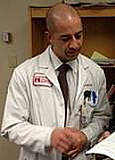Charles Shagass (USA)

Dr. Charles Shagass, psychiatrist, was an internationally recognized pioneer in studies of biological causes for mental disorders. Dr. Shagass was a professor of psychiatry at Temple University Hospital in Philadelphia, USA, from 1966 until 1990. He specialized in the neurophysiological aspects of psychiatric illness, emotion and learning. He contributed to the electrophysiology of mental illness and influenced the increasingly practiced biological approach to psychiatry. He died in 1993, he was 73.
In 1985, as President of the World Federation of Societies of Biological Psychiatry (1981-1985), he organized and was host to the Fourth World Congress of Biological Psychiatry, which brought more than 2,500 scientists from 62 countries to Philadelphia, USA.
He was born in Montreal and received a bachelor's degree from McGill University in Montreal. He received a master's degree in psychology from the University of Rochester and, after wartime service with the Royal Canadian Air Force, returned to McGill for his medical degree. He started his career at McGill and headed the electrophysiology laboratory at the Allan Memorial Institute at the university from 1952 to 1958. Before coming to Temple University Hospital in Philadelphia USA, he taught at the University of Iowa. In Philadelphia he founded the Temple University Psychiatric Electrophysiological Laboratory at Eastern Pennsylvania Psychiatric Institute. After reaching emeritus status at Temple in 1990, Dr. Shagass became a professor of psychiatry at the Medical College of Pennsylvania. He continued his research in psychiatric electrophysiology by establishing the Clinical Research Center at Norristown State Hospital.
Dr. Shagass wrote seven books and more than 250 articles espousing a biological approach to psychiatry, which has won wide acceptance. He was president of the National Society of Biological Psychiatry, the American Psychopathological Assn., the National Assn. of State Mental Health Research Institutes and the World Federation of Societies of Biological Psychiatry (1981-1985), which he helped to create in 1974.
